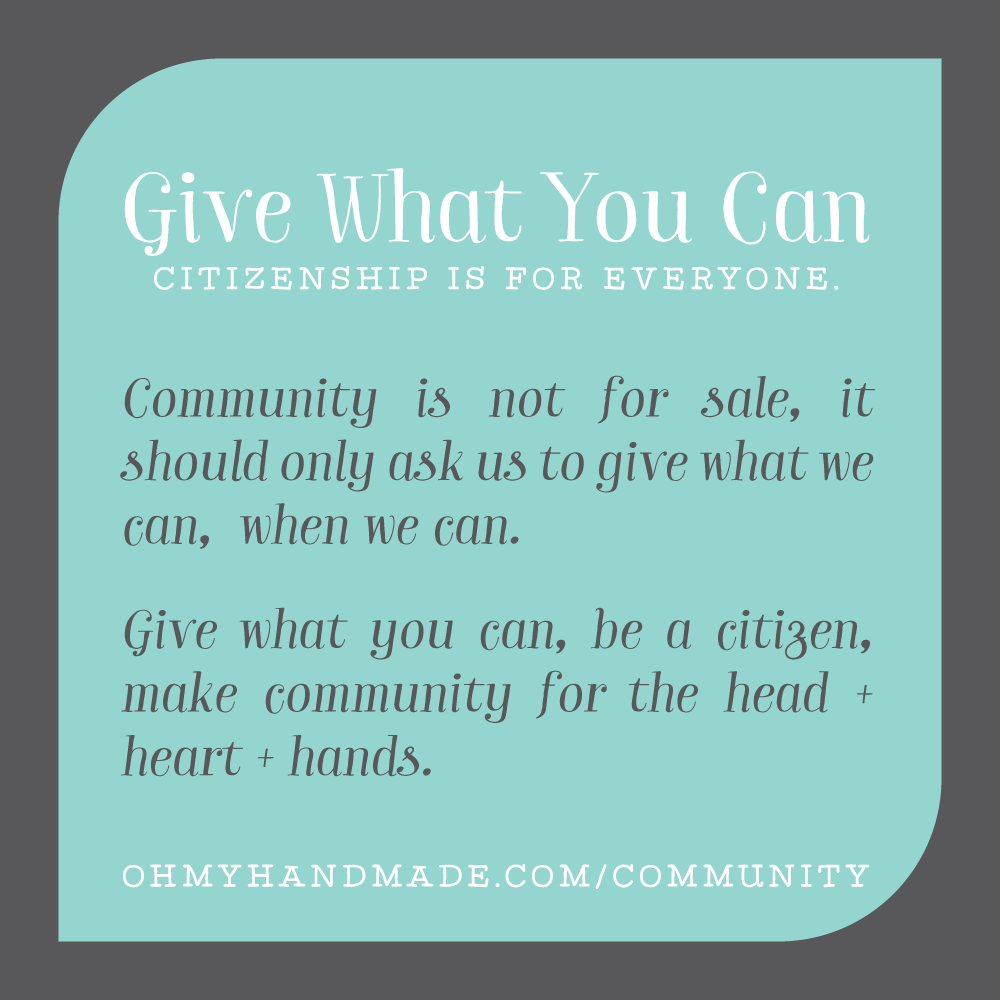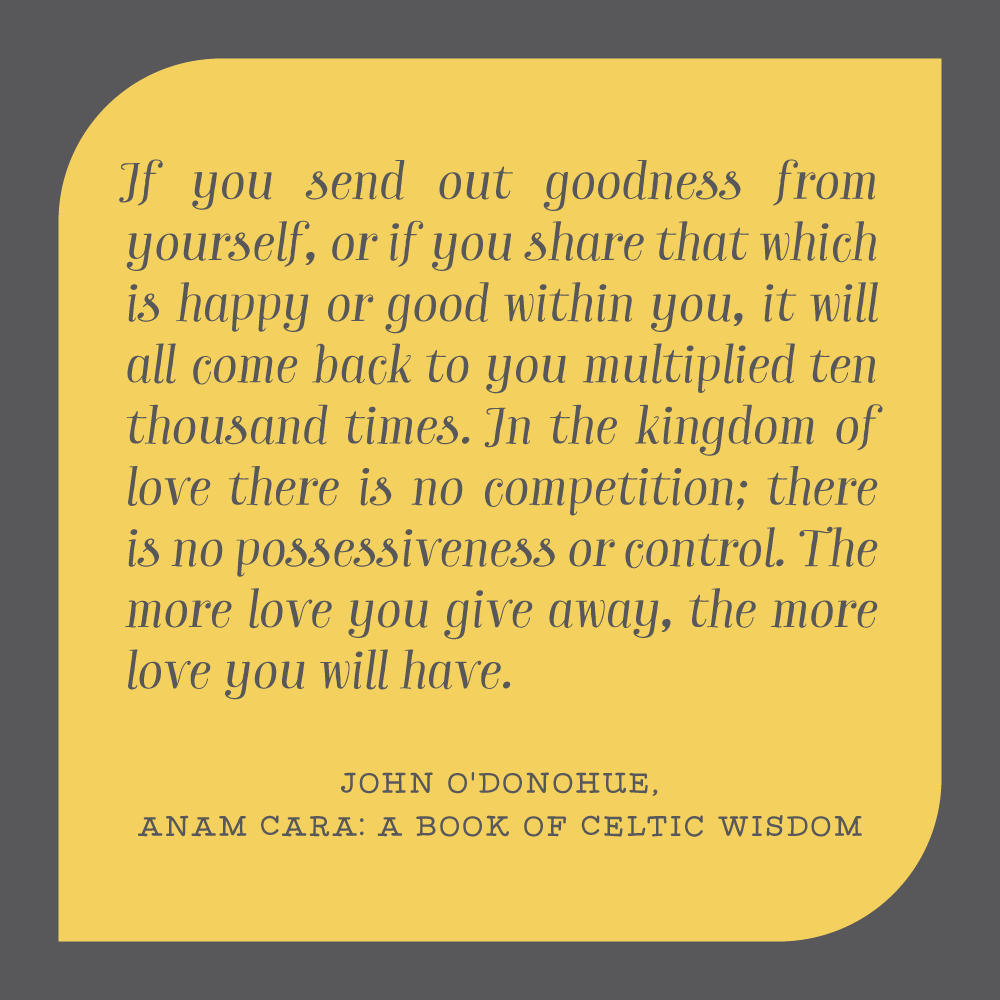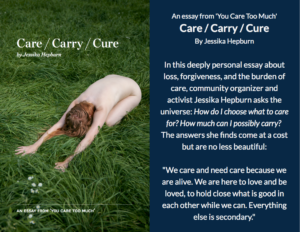

The community we’ve worked to create here has always been a culture of giving and openness. The people we’ve gathered are some of the most generous and open you will find anywhere, if you are kind we like you already. We are an example of how handmade can connect us across all sorts of divides to make meaning together. It has been a grand experiment in finding a common language of goodness and how to create a community without excluding anyone.
Things have changed since OMHG began and while we’ve grown and evolved the goal is still welcoming everyone to experience what the ethics of handmade community are. Not simply ‘handmade’ as a consumer good, but the patiently cultivated handmade goodness that is the centre of a life or community of integrity. Two hands can make something, a hundred hands can make anything, all our hands working with purpose and unity can make the world whole. This is the fundamental principle behind Gandhi’s teachings on the “khadi spirit” and why the spinning wheel became a symbol for non-violence, independence, and weaving self-reliant communities.
We started off meeting on Twitter every week then created an online gathering space so we could connect and share knowledge. At that time there was little available and we sold memberships to keep the doors open and lights on while investing in collaborations. Unfortunately this still created a structure that automatically had people on the outside and people on the inside, this is by definition not true community.
Lately a new generation of businesses have sprung up selling community and marketing to our need for belonging. As the word community becomes more popular it is hard to know what it means to people or where to gather with anyone anymore. Who is in it for community and who wants to hustle you? You can pay to hang out with people like you but real diverse places to connect are getting scarcer. We’ve never tried to protect our model because we always wanted it to be shared freely. Emphasis on freely.
While some of me thinks it is total ego to imagine other communities have been inspired by our experiments the rest knows it doesn’t matter if they have. If I know better I have to do better, even if no one is watching. Thankfully dear companions are along for this journey and to share the wisdom of their heads, hearts, and hands.
Slowing down has made these things clear:
-
Community is a gift. It is not a commodity or a club, and gifts are meant to be given.
-
Citizenship is for everyone. To be a citizen is a choice and a responsibility that is not determined by how much you can pay but by how much you give of yourself to others.
-
Cooperation is only possible if we turn away from competitive models and create new ones that value any contribution.
I do not want to be part of systems that make community a commodity or a citizenship that is not for everyone. Seeing community being sold and really looking into why that is uncomfortable by talking with so brilliant minds this year helped make things clear. A community that only values the investment of a few is a segregated one, on or offline, same thing. We need to open doors instead of close them and give each other more opportunities to share our gifts freely and succeed simply or we will continue to segregate the internet and confuse clubs with community. The only answer is to keep trying to create models that are a joy to have other people borrow and share, something inline with the ethics of community and that brings us together to collaborate instead of in isolated competitive groups. We can repeat old models of us vs. them or try pioneering new ways of putting people before profit, even before our personal comfort.
Our new payment/citizenship structure is super simple:
Give what you can.
Everyone who wants to be a citizen and help make a community for the head, heart, and hands is invited to join us. We want to create a multicultural, multigenerational community full of all ages and abilities who make goodness together and share their collective knowledge. If this is important to you, come and be welcome! We are eliminating membership fees and are simply asking you to give what you can, when you can. Give financially, but we also value contributions of time, love, and support. Change how much you give when you need to and always have a place where your contribution is valued. In May at our next Annual General Party we’ll see if this experiment in giving works or fails and share the results with you as always.
Give what you can and register as a citizen in our community for the head + heart + hands.
You have every blessing to use this idea. Let’s start a new trend of trusting your offering is of such value you can afford to give it away to anyone who needs it. Rebel and give away what you have, even if you only have a little bit of goodness. Reach out to everyone and invite them to participate. Give up control of your gifts and offer them to whoever could use a hand, this is what it means to be of service. Continue to trust those who value what is good will find value in you and invest in your gifts. Imagine an economy of expansiveness that invested in our gifts so we could give them away?
So our community will do our part to lead by example and show community isn’t something to sell, it is something to give.
Cheers to giving what we can, when we can. To giving up possession and control so we can share all that is good within us, with each other.

